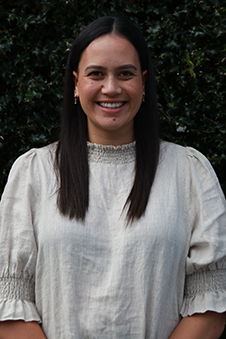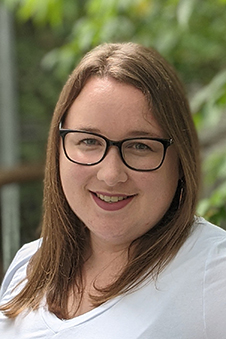Improving the sometimes-devastating birth and post-natal experiences of wāhine Māori in Aotearoa is the aim of a group of University of Otago researchers.
In the first of a series of studies, Department of Psychology academics shed light on the stories of those who had given birth by emergency caesarean.

Felicia Lawrie.
Lead author Felicia Lawrie (Ngāti Kahungunu, Ngā Puhi), a PhD candidate in the department, says the postnatal period can be a challenging time for all birthing parents, with labour and the birthing experience contributing factors.
However, wāhine Māori are over-represented in several negative post-natal outcomes, including those related to caesarean deliveries. They are more likely to experience discrimination and marginalisation in the healthcare system and, devastatingly, Māori mothers are three times more likely to die by suicide than non-Māori mothers.
“Finding ways to support, empower, and uplift wāhine and their whānau is crucial to providing culturally affirming care and contribute to equitable birthing outcomes in Aotearoa.
“We wanted to understand the experiences of those who had a caesarean delivery – which account for about one-third of all births in Aotearoa – to identify how the healthcare system can better meet the needs of wāhine Māori during pre and postnatal care,” she says.
The study, published in the Journal of Health Psychology, used kaupapa Māori principles to conduct interviews with wāhine Māori who gave birth by emergency caesarean delivery.

Amanda Clifford.
Co-author Dr Amanda Clifford (Waitaha, Kāi Tahu, Kāti Māmoe) says bodily autonomy and choice were discussed by all participants, as was the need for mental wellbeing to be a larger focus of perinatal care.
“Wāhine described some beautiful interactions with maternity care providers, including midwives, nurses, and doctors during their pre and postnatal care. Nurses remembering names or asking sincere questions about the wellbeing of the mothers, doctors providing the space for cultural practices to take place, and midwives providing care that respected individual values and aspirations, were among some of those positive interactions.
However, many participants felt they were unable to voice their desires and speak up for what they wanted or needed during birth, likely based off historical bans on traditional Māori practices, such as birthing in a squat position.
They also felt insufficiently supported by post-natal check-ups which focused purely on physical markers of health rather than taking a wider holistic view.
“The results imply that culturally affirming care which provides information to enable wāhine and their whānau to make informed choices, honours women’s values and beliefs, and addresses physical, emotional, social, and spiritual wellbeing in a holistic way, is likely to be more effective and result in positive birthing experiences.
“Utilization of Māori models of health care, such as Te Whare Tapa Whā, which acknowledges four interconnected areas of one’s overall wellbeing – taha wairua, taha whānau, taha hinengaro, and taha tinana – is integral,” Dr Clifford says.
Speaking from her own experience, Lawrie says pregnancy, labour, and birth is a time where mothers may feel like they have to completely surrender to the unpredictable nature of something that can feel so out of their control.
“I also believe there are things which can be controlled, and those things can be crucial in impacting the overall experiences that a mother has during this time.
“Giving wāhine the space to share their birth aspirations and respecting them, providing them with information about procedures and interventions, allowing them to make choices which are in line with their values, are all ways in which mothers can be supported during such a pivotal life experience,” she says.
The researchers hope the study, the first of many planned on the unique experiences of wāhine Māori in the birthing space, will inspire wider change across the healthcare system.
“We would love to see routine mental health check-ups become as frequent as physical health check-ups, and space for spiritual and cultural rituals and practices to take place during labour and delivery.
“We also hope culturally affirming Māori birthing practices such as the use of muka ties, in place of cord clamps, will be considered, as well as the involvement of whānau during medical procedures.
“Whether it is someone’s first or eighth time giving birth, each birth is unique and transformative for the individual and their whānau. We want these experiences to be positive, to be culturally affirming, to be platforms whereby wāhine are able to step into motherhood feeling supported, safe, and cared for,” Lawrie says.
Publication details
Birth by emergency Caesarean delivery: Perspectives of wāhine Māori in Aotearoa New Zealand
Felicia Airini Lawrie (Ngāti Kahungunu, Ngā Puhi),Yvonne Awhina Mitchell (Ngāti Awa, Ngāi Te Rangi), Ashleigh Barrett-Young, Amanda Ellen Clifford (Waitaha, Kāi Tahu, Kāti Māmoe)
Journal of Health Psychology
https://journals.sagepub.com/doi/full/10.1177/13591053231218667